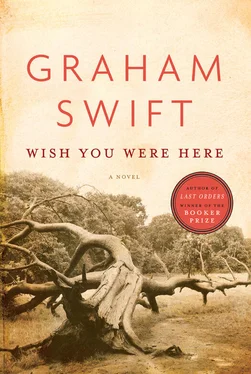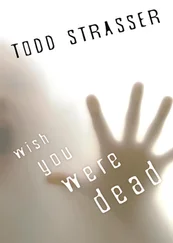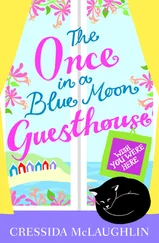Of course she could remember Tom. Little Tom, then big Tom, just as big as his brother. Big enough, certainly, to go off and be a soldier. When Jack had told her — but only after it had happened — that this was what Tom had done and that he, Jack, had known all about it beforehand, she’d breathed, she couldn’t help it, a grateful sigh. She’d been surprised, but she’d been glad, though she’d tried not to show it. There wasn’t any reason to be cut up about it — if, so it seemed, Jack wasn’t. If it was what Tom had wanted and planned and he’d gone and done it, then good luck to him. And if Jack had been in on it and wasn’t cut up about it, then so much the better.
It was Michael Luxton who’d been cut up about it, and had taken it out on Jack. But Jack had just taken that in his turn, so it seemed, as if he were doing it for Tom’s sake, not even telling his dad, till he thought it was safe, where Tom had gone. Though he’d told her, one January afternoon at Westcott. ‘He’s joined the army, Ell. You don’t know that I told you this.’ As if his dad might have come round and throttled it out of her.
That day, that January afternoon, had in fact been one of the better, brighter days of her life. She’d squeezed and hugged Jack’s big, familiar body with a new eagerness (had he noticed?), but also with a delicacy, as if he might have been bruised by real blows from his father. Michael Luxton, it was true, could sometimes scare her. He wasn’t scary in any obvious way, but he could sometimes frighten her. If there should be a choice of fathers with whom you’d have to live alone for the foreseeable and barely thinkable future, then she’d choose her own father, small and nimble, not towering and looming. Small and sly and with a regular glint of mischief in his face, which she knew was a mask (even though she could be a sucker for it), a bravado put there mainly by alcohol. Her father owned her, but he didn’t scare her. She’d choose him of the two. But then she’d chosen Jack, who could sometimes look the image of his father.
‘This is just between you and me, Ell.’
She’d run her palms softly over his big frame as if she’d never done it before. Their situations were the same now, equal. They each had to shoulder their fathers, just their fathers. Tom was gone. A soldier. One of the better days of her life. Though she could feel, beneath the skin, beneath the imaginary bruises from his father, the wound of Tom’s departure hidden in Jack’s heavy flesh.
It was a grey, bitter January afternoon, the heater ticking in her bedroom—‘their bedroom’—and somewhere out in the cold of the farm, if he was only consulting his hip flask in the Land Rover, her dad was keeping his distance, as usual, so they could have the house. It was how he kept her there — it was the deal. What a pittance of a deal. And, Jesus, they were both twenty-six.
But Tom was gone, and this was one of the better afternoons. There was more than one kind of soldiering. Not all of it was done by soldiers, or by men. She’d shut her eyes and run her fingers over Jack’s shoulders, down his spine, as a blind person might seek to recognise the shape of something. The shape — the ache in her own flesh — of her love for him.
Sometimes Ellie could think she didn’t know, she didn’t understand at all, this man she’d known, in fact, as long as she could remember. Since long before he was a man or she was a woman. That was how it was. Man and boy, girl and woman. Sometimes the thought of it, as if they’d been born together, could make her smile, sometimes it would crush her. She knew that other women might have thought: What a shame. What a shame for poor Ellie Merrick that it wasn’t the other way round, that Jack wasn’t Tom. But she’d never, honestly, thought of it like that, and when she imagined those other women, shaking their heads, her blood could gather and she could feel she had claws she might fiercely use in defence of Jack Luxton. She could feel as she supposed Jack must have felt when he copped it from his dad on account of his little runaway brother.
Ellie didn’t know much about the army, but she could see it was a simple, all-in solution for a man of Tom’s age, and Tom would hardly have been the first. One moment a cowshed in a gone-to-pot farm, next moment a barracks. The main thing was he’d got out . He’d shown it could be done. Tom was not unlike her mother. And Jack might have done the same himself, as much as eight years ago, or more. But then his mother would have still been alive, and Tom would have been barely ten.
And, anyway, if Jack had ever gone off to join or do anything, it would have meant deserting her, Ellie.
She didn’t know Jack? She didn’t understand how it truly was with him and her? Oh, but yes she did.
Once upon a time, when Ellie was still a pupil, like Jack, at the tiny primary school in Marleston, jealousy had entered her life in the form of an unexpected new arrival at Jebb Farm. At first she’d supposed that this strange, nagging emotion was because she would have liked the same for herself, a little baby brother or sister. Up until then she and Jack had been equal in not having either.
But no surprise event like the one that had occurred at Jebb Farm was to occur at Westcott Farm and there was certainly fat chance of its ever occurring once, several years later, Ellie’s mother had made her sudden exit. By then, so far as new arrivals went, there was a much greater chance that Ellie herself, if she wasn’t careful, might get pregnant. But by then, too, Ellie had grown up with her jealousy and knew that it wasn’t so much that she wanted any more a little sibling of her own, but that she was jealous of that part of Jack that belonged to his brother.
How it had once pained her, and how she’d had to hide it, when the three of them — Jack, Tom and Vera — had gone away together those two years running. Only a week, but how her jealousy had seethed. But then how her heart had soared (though she’d never said so) when she’d got that postcard from Dorset.
‘We are all living in a caravan called Maralin.’
Jealousy wasn’t even the word, perhaps, by the time her mother had done her bunk. Ellie had grown up resenting Tom Luxton, resenting him and hiding it. Hiding it to the extent sometimes of even pretending that she too, like his big brother, loved him. Wasn’t he just so lovable? They’d played games, once, she and Jack, of pretending they were Tom’s mother and father.
Wasn’t he just so adorable? All of which acquired its complication when, many years later, Tom was old enough to be interested in girls — and vice versa. Of course she could see that Tom was the kind of boy any girl would fall for. Fall over backwards, like little Kathy Hawkes. Well, good luck to her. And of course she could see that there was even sometimes just a touch of unease, of jealousy coming in the other direction, from Jack.
Well, it levelled the score a little. She didn’t exactly tell him not to be so daft. But couldn’t he damn well see? Couldn’t Jack see? Eight years was eight years. And couldn’t anyone see by then, even if Jack couldn’t, that — call her stupid, call her not choosy — she was Jack’s and Jack’s only, plain and simple. It was how it was, it was how she was. Where else did all that resentment come from?
But Jack had simply never seen, never noticed what would have been the biggest reason for his not needing to have any jealousy of his own. That she could have done without little Tom altogether. Tom himself could see it, she knew that. He had sharper eyes than his brother. But he’d just shut up about it.
It was something short of the whole hundred per cent, that part of Jack that she could call her own, and what she did have, she only had properly, after her mother’s departure, on a couple of weekday afternoons. And that only as a pay-off from her father. Jack, too, was a slave to his father, and he was his mother’s favourite (she knew that and she didn’t blame Vera) and there was this big chunk of him anyway that belonged with his brother. How much did that leave for Ellie?
Читать дальше








![Питер Джеймс - Wish You Were Dead [story]](/books/430350/piter-dzhejms-wish-you-were-dead-story-thumb.webp)



